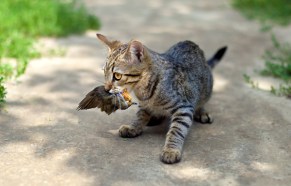News
-
 Chemistry
ChemistryGold-digging microbe
By spitting out a molecule, a bacterium draws solid gold out of solution.
-
 Oceans
OceansLife found deep below Antarctic ice
Lake buried under 800 meters of ice hosts cells, researchers find.
By Janet Raloff -
 Health & Medicine
Health & MedicineSome service members sleep too little
Of active-duty military personnel seeking help for sleep complaints, two-thirds get six or less hours per night.
By Nathan Seppa -
 Life
LifePigeons’ prominent plumage traces to one gene
A mutation responsible for ruffs, crests and collars appears to have arisen once and then passed among species through breeding.
-
 Space
SpaceAn atom sheds light on neutron stars
By measuring a neutron-rich atom on Earth, astronomers virtually dig into the crust of dead stars.
By Andrew Grant -
 Health & Medicine
Health & MedicineSpecialized nerve fibers send touchy-feely messages to brain
Nerve fibers send pleasure signal to brain when mice get caressed.
-
 Earth
EarthWarmer is not always wetter
Compared to global warming caused by solar radiation, global warming caused by greenhouse gases results in less rainfall, simulations suggest.
By Erin Wayman -
 Space
SpaceScale weighs black holes better than before
Microwave telescopes on the ground determine the masses of supermassive objects millions of light-years away.
By Andrew Grant -
 Humans
HumansSome chores linked to less sex
Husbands who do more household chores make love less often, a new study suggests.
By Nathan Seppa -
 Humans
HumansPublished clinical trials shown to be misleading
A comparison of internal and public reports about Pfizer’s drug Neurontin reveals many discrepancies.
-
 Animals
AnimalsCats kill more than one billion birds each year
New analysis doubles estimate of avian death tolls, revealing that hunting felines take bigger bite out of wildlife than expected.
By Susan Milius -
 Life
LifeCaribbean’s coral reefs approach tipping point
A survey of 19 colonies suggests many may soon begin to shrink.